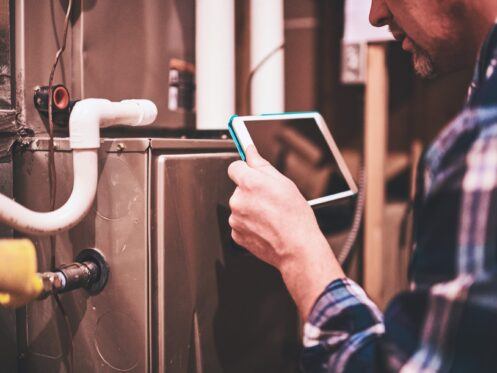When it comes to heating your home, the utility costs can be quite a burden. The main reason any homeowner considers switching to natural gas is to save money. Gas is more reliable than electricity, cheaper than oil, and more effective than coal. It’s also better for the environment. Natural gas is a raw product, and once you convert, you’ll enjoy heating your home with a system that’s nearly 100% efficient.
Why Switch to Natural Gas?
Almost half of the homes in the United States use natural gas for heating. That number is even higher in the Northeast. This is because gas provides a cheaper way to heat when compared to other methods. It’s not unusual for those heating with electricity to have extremely high utility bills during the cold winter months. By switching to a high-efficiency gas furnace, those monthly costs can be significantly lower.
What to Ask Yourself Before Converting to Gas
First, ask yourself if you can switch from electricity to gas before you make any changes. You’ll need to check with your local utility company to see if there’s an existing gas main under your street. There was a time when bringing natural gas into neighborhoods was simply too expensive. If your home dates from this period, you may not have access to natural gas. If there isn’t a gas main, you’ll need to work with your utility company and neighbors to see if getting one is possible.
You have to take a look at your home as well. Do you have a finished basement? Is your current heater in a spot that’s hard to reach? In these situations, it may be too hard to make the switch. You also need to know if the cost of converting is worth it. Take into consideration the upfront cost as well as maintenance costs. While heating with gas is economical, the upfront investment may not be worth it.
Types of Conversions
Switching to natural gas isn’t that difficult if your heater currently burns oil for heat. You could fit your existing heater with a gas conversion burner or replace your furnace with a gas-burning one. If your oil-burning furnace is 10 years old or older, it may be time to consider replacing it. This makes the decision easy.
If you currently have electric baseboard heaters or radiators, you’ll need to have ductwork added to your house. This can be costly, if at all possible. If your electric heat comes from a forced-air heater, it’s easier because you already have ductwork in place. Using this existing ductwork makes a conversion cost-effective.
If you’re using propane to heat your home, you already have pipes, but your new gas heater will require larger lines. You will have an empty propane tank to remove, and you may also have to convert your other appliances.
How to Get Started
If gas is available in your neighborhood, you’ll need to schedule a consultation. We’ll help you find the best gas furnace for your needs. We do this by assessing your current heating system, talking to you about any concerns you may have regarding comfort, and reviewing all of your options with you.
Next, you’ll have to consider any electrical needs this project may have. While your new furnace will heat with natural gas, there’s still some electrical work involved. Typically, this means switching from a 220 breaker to a 120 breaker. Electricity is still needed to run components, such as a fan, in gas heaters. You’ll need to hire a licensed electrician for this.
What to Expect
Having your home’s new gas furnace installed and converting to natural gas involves several steps. First, you’ll need a gas line that runs from your street to your house. You will also need to have a gas meter installed. After that, we’ll have to place a new gas line from the meter into the house where your new gas furnace will be. During installation, we’ll connect the new gas heater to the existing or newly added ductwork. During the final steps, we’ll run flues from the heater to the exterior vent for exhaust. After all of this, we’ll test for leaks. Once we’re assured there are no leaks, we’ll turn on the gas furnace and ensure all components operate within the specifications set by the manufacturer.
How Much Does a Gas Conversion Cost?
While all of the figures depend on your specific needs, the average cost of a new gas heater ranges from $3,000 to $7,600. The determining factors for this are the size of your home and the furnace’s efficiency, along with labor charges. Most homeowners decide to install a new air conditioner at this time too. Depending on the efficiency, size, and level of complexity, this can cost anywhere from $4,200 to $12,000. The final cost is how much you’ll spend on the gas line installation and electrical work. The length of wiring and pipes needed for the job determines these prices.
Enjoy the Benefits of Converting to Gas
Among the many ways available to heat your home, natural gas is one of the cleanest options. Its emissions are mostly water vapor, with only a small amount of carbon dioxide. When it comes to carbon dioxide, gas creates 45% less than coal and 30% less than wood. You’ll be heating your home while leaving behind a smaller carbon footprint.
Natural gas is a reliable heat source. Gas lines are located underground, where they’re protected from the elements. You’ll also enjoy a steady supply of gas rather than waiting on fuel delivery. Gas furnaces can warm your home faster than electric heat. This is because gas heat ranges from 110 degrees to 120 degrees Fahrenheit.
You’ll also increase your home’s value. Heating with natural gas is an excellent selling point for potential buyers. It may help you sell quicker and make a larger profit.
Your Gas Conversion Experts
Laury Heating Cooling & Plumbing is an HVAC and plumbing company serving Vineland and South Jersey. We’ve been providing homes with comfort for 75 years. The company was started in 1945 by Charles and Paul Laury. Our dedication and hard work over the years has resulted in many accomplishments. Some of them include being a Carrier President’s Award Winner, receiving the Angie’s List Super Service Award for seven years, and winning the Century Club Award – Home Performance with ENERGY STAR for nine years!
We focus on high standards without high pressure by offering prompt, polite, and professional services. If you’re thinking about switching to natural gas, we can discuss your options and answer any questions you may have. In addition to natural gas conversions, we provide heating and cooling repairs and installation. When it comes to our plumbing repair and maintenance services, you’ll see that we do routine inspections that will catch problems early on before they interrupt your life. We handle water heater services, pipe repair, sump pump services, and sewer line service, along with faucet, sink, and toilet installation and repairs.
Contact Laury Heating Cooling & Plumbing today to learn more about gas conversion and all of our heating, cooling, and plumbing services.



